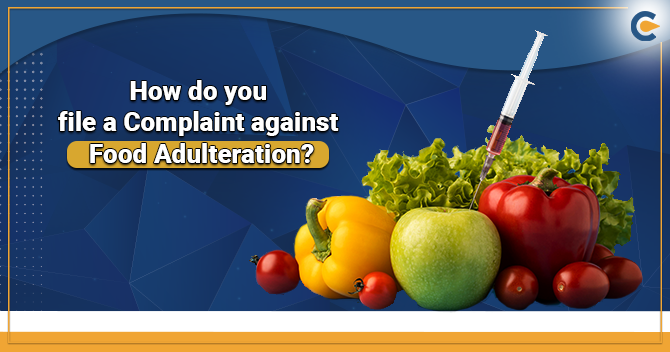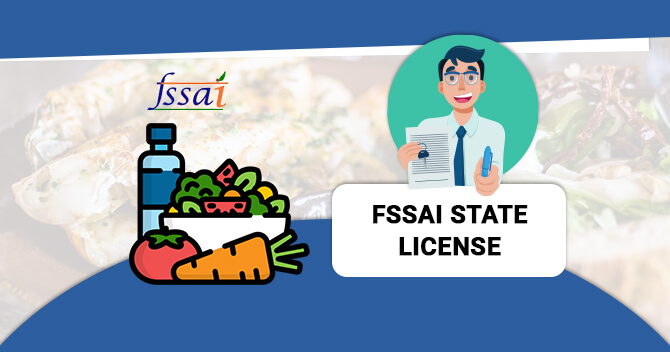Food adulteration can be a significant issue of concern when you consume a food product of any kind. You must have come across with a food product which was stale, infected or contaminated at a certain point of time in your life. What steps did you take, to ensure such occurrence do not repeat itself ever in the future?
In India, the FSS Act, 2006 and the Prevention of Food Adulteration Act, 1954 provides regulations and ensures that every citizen of India gets food, which is safe for consumption. Further, in this article, we are going to learn how you can file a complaint against the adulteration of food products.
What Is Food Adulteration?
As per the Section 2 (a) Prevention of Food Adulteration Act, 1954 the definition of “adulterated” food is as follows;
- If they sold food item is not of nature, substance or quality demanded by the customer. Additionally, if the food product does not conform to the quality, standard or nature it was represented as then it can be categorized as an adulterated food
- When the food article contains any other substance which might affect or the article is so processed which might cause a health hazard, comprised in its nature, content or quality
- Any food article prepared, packed or kept under unsanitary conditions, which lead to contamination of such food item
- In case the constituent of the food item has wholly or partially abstracted that might affect the health of the consumer
- If the food article is obtained from a diseased animal
- In case the food product is entirely or in part is a filthy, putrid, rotten, decomposed, or sick animal. On the other hand, vegetable items containing insect/ pest- infected or are unfit for human consumption in any way
- Food item containing any poisonous or any other ingredient which might be detrimental to health
- Article consisting of any prohibited preservative or permitted preservative used above the prescribed limit
- If the quality of the food product is below the prescribed standards or consists of ingredient which is not within the permissible limit
- Any other reason as specified
However, it is provided that if the quality or purity of the food product gets deteriorated due to any natural reason/ factor, it would not be considered as food adulteration.
Food adulteration also includes the display of any false or misleading advertisement intending for the sale of any food item.
Causes of adulteration of food: How food adulteration happens?
Adulteration of food is a long term problem dating back from ancient times. It can be intentional intending to earn more profits from the products sold, or it can be unintentional, caused due to natural causes or any other such reason. Based on the type adulterant, food adulterations are of three types;
- Intentional adulterants
- Incidental adulterants
- Metallic adulterants
| Sr. No. | Type of food adulteration | Substance used |
| 1. |
Intentional adulterants |
Sand,
marble chips, stones, mud, other filth, talc, chalk powder, water, mineral
oil and harmful colour |
| 2. |
Incidental adulterants |
Pesticide
residues, droppings from rodents, larvae in food product |
| 3. |
Metallic adulterants |
Arsenic
from pesticides lead from water, effluent from chemical industries, tin from cans |
Other causes of food adulteration are as follows:
- Presence of poisonous
- Deleterious substances
- Filth
- Foreign matter
- Microbiological contamination
What steps are taken by the Government against Food Adulteration?
The Government of India is constantly taking steps against the adulteration of food. Given below are some of the steps taken by the Government:
- Food Safety and Standards {Licensing and Registration of Food Business} Regulation, 2011
- Food Safety and Standards {Packing and Labeling} Regulation, 2011
- Food Safety and Standards {Laboratory and Sampling Analysis} Regulation, 2011
- Food Safety and Standards {Food Product Standards and Food Additives} Regulation, 2011
Objectives of Food Safety Measures
The following are the reasons for setting up measures for maintaining food safety;
- Protection from harmful food products
- Prohibition of the business of sub-standard provisions
- Protection of consumer interest
- Prevention of deceitful practices related to food
Frequent Examples of Adulteration of Food Items
The frequent examples of contamination of food are as follows;
- Presence of insects, worms, dust particles or fungus in foods and beverages
- Adulteration of dairy products such as milk and ghee
- Adulteration of spices or spice powders
- Sale of expired packaged food
Problems that a Consumer can Complain About
It is important to know about the problems you can file a complaint against, to the food safety authority, whenever you face them. The common occurrence of food adulterations are as follows;
- Sale of expired food items
- Dust, insects, worms or fungus on food
- Incorrect packing
- Incomplete/insufficient/improper information on food label
- Misleading commercials
- Address of maker/ marketer not mentioned
- No enlistment of harmful ingredients like MSG
- Lack of warnings
- Any other form of contamination as per the Prevention of Food Adulteration Act, 1954
Compensatory Remedies for Victim of Food Adulteration
According to the Food Safety and Standards Act, 2006, the given below remedies can be granted to the victims under section 65 of the Act. Any person who manufactures a food article either by himself or through any other person which can be injurious to the consumer or can cause his death, such manufacture shall be made liable for the payment to the victim a fine which may exceed to :
i) At least five lakh rupees in case of death;
ii) Not beyond three lakh rupees in case of serious or grievous injury;
iii) Not more than one lakh rupees in other cases of injury. Provided that such compensation shall be paid at the earliest before six months and an interim relief in the case of death of the person shall be sent to the family of the victim within the time period of thirty days.
Procedure to File a Complaint against Adulteration of Food
You should be aware of the food products you are consuming. Sometimes it happens that you get a food product which is infected with worms or contains dust or any other external matter, which should not have been there in the first place. Therefore, to avoid such situations, you are required to know what steps you can take. In other words, you need to know how you can file a complaint against such an occurrence.
If you come across any restaurant or any other food business that you see is taking part in or perpetrating food adulteration, you can file a complaint against the Manufacturer, Restaurant owner, Shopkeeper or Employer to the Local Health Authority/ Food Safety Authority’s district commissioner or the Consumer Forum.
Furthermore, you can approach the Consumer Forum at any of the three levels, namely; district level, state level and national level. The complaints registered in this manner have the original jurisdiction at district levels and further appellate court at a state or federal levels.
Also, the consumers have an option to directly reach out to FSSAI through an online platform called the Food Safety Voice. This platform provides the provisions for registering a complaint against adulterated, substandard or unsafe food products. You also can complain about the poor labeling of the product or any misleading advertisement you came across regarding the product.
Also, the Government provides you with another option to file your complaint against adulterated food, namely, the Food Connect Application. You can download the Food Connect Application application from the Google play store or Apple store based on the type of Operating System you are using.
Furthermore, follow the given procedure to file your complaint on the Food Connect Application:
- Open the Food Connect Application
- Select the right category from the given option namely; Packaged food or Premises
- Specify the kind of issue you faced or are facing
- Describe the problem with relevant pictures
- Submit your complaint
Documents required to be submitted
The complainant must submit the following documents:
- The complete details and Address of the place from where the food product is purchased (name of shop, name of the food and the exact locality).
- Pictures of the defect in the adulterated food product
- The medical reports that confirm that such an ingredient of the food product has certain health risks and detrimental for human consumption (in cases of adulteration of food product).
Filing a Complaint against Misleading Advertisements
Moreover, you can also register a complaint against any misleading ads. To do so, you need to take the following steps;
- Visit the official website of the Advertising standards council of India
- Go to “Lodge your complaint” menu
- You will be redirected to the ASIC: Consumer online complaint form page
- Fill your personal details and the description of the complaint you are making
- Attach a video, link or image of advertisement if you have any
- Enter the Captcha code
- Then click on “submit your complaint.”
Landmark Judgments:
1. In the case of Nestle India Ltd. v FSSAI , the food safety regulator held and directed the Nestle India to immediately withdraw all the nine variants of Maggie noodles from the market as it was proved to be “unsafe, unfit and hazardous ” for the consumption of public because of the high level of monosodium glutamate in its taste maker.
2. In the case of United Distributors v UOI, the Delhi high court approved for the selling of an assortment of the Guliyan Belgian chocolates subsequent to when the petitioner (importer) rectified the labelling defects according to the FSSAI guidelines.
Penalties imposed on defaulters of food adulteration
As per the Sections 51- 64 of Food Safety and Standards Act, 2006, the following punishments are imposed upon the people who perpetrate acts that result in food adulteration:
- Any person who sells any material which is not as per the consumer’s demand is liable to pay a maximum fine of Rs. 5 lakh when finding guilty
- Anyone who manufactures sells, stores, distributes or imports any sub-standard food item; any food item which contains decayed matter, any article stored in unhygienic conditions is liable to pay the penalty
- Anyone who stores, manufactures, distributes or imports any misbranded food-based product, is liable for a fine up to Rs. 3 lakh
- Any person who publishes a misguided advertisement or falsely representing the quality of the food or provides false guarantees to consumers might have to pay a fine up to Rs. 10 lakh
- If anyone distributes a product containing a non-severe adulterant, they may be fined up to Rs. 1 lakh, but if the adulterant is harmful to health, the fine may be extended to Rs. 10 lakh
- Any person who violates any regulation specified in the Act may be asked to pay a fine up to Rs. 2 lakh
Conclusion
Food adulteration is a significant cause of death in India. Also, it is the reason for many types of food borne diseases such as food poisoning, vomiting, constipation etc. The Indian Government is constantly making efforts to reduce this number and increase awareness about food adulteration in the minds of the general public of our country.
Read our article:FSSAI Guidelines on the Clearance of Imported Food in India











